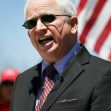Every state requires prospective lawyers to be screened for character and fitness before admission to the bar. Once admitted, all state bars are expected to provide oversight that assures their members act ethically to advance the rule of law and protect American democracy. But recent actions by both public and private lawyers working on behalf of President Trump have fallen short of these critical goals, and a national lawyers’ group has called for disciplinary actions against them.
In a strongly-worded statement, the aptly named Lawyers Defending American Democracy (LDAD) has demanded action. They asked state bar disciplinary authorities to sanction Texas Attorney General Ken Paxton, 18 other state AGs, and 126 Republican attorney members of Congress who they claim breached their state bars’ ethics rules when they petitioned the U.S. Supreme Court to overturn certified election results in four battleground states by filing or supporting frivolous election challenges that had no legal or factual basis.
The Supreme Court rapidly denied the petitioners’ request in the case since they not only lacked standing but failed to provide evidence of fraud. Instead, their petition amounted to another frivolous election challenge that merely repeated the same incoherent allegations that lacked legal or factual basis and had already been rejected by more than 40 state and federal judges. Others who joined Paxton’s case included AGs from Florida, West Virginia, Alabama, Arkansas, Louisiana and other states.
The American Bar Association’s Model Rule of Professional Conduct 3.1 states, “A lawyer shall not bring or defend a proceeding unless there is a basis in law and fact for doing so that is not frivolous.” In addition, 4.1(a) and 8.4(c) put lawyers at risk of sanctions for engaging in dishonesty, deceit and misrepresentation — in or out of court.
Yet, all too often, experts say, nothing happens to those who violate these rules. Professor Deborah Rhode, director of the Center on the Legal Profession at Stanford University School of Law in California, told Texas Lawyer that lawyer disciplinary authorities have not been willing to sanction prominent lawyers for frivolous claims.
“That needs to change, particularly where the conduct is so egregious and the stakes are so high for public confidence in the rule of law, the democratic process and lawyers’ ethics,” Rhode said.
What then is the purpose of character and fitness requirements and the bars’ ethics offices? Are they merely public relations entities designed to give the appearance of supervision? Or could they only have limited authority as is the case in Texas?
Even if a complaint is filed against Paxton, Rhode warned, an ethics violation might fail because of the wording of the Texas standard which would merely require the AG to “reasonably believe” there was a basis for his petition. Since so many other states signed on to his petition, she warned, the Texas chief disciplinary counsel could believe there was a legitimate basis for the filing.
Indeed, the Texas Bar has treated Paxton with leniency on previous occasions. When the U.S. Supreme Court legalized same-sex marriage, Paxton issued a legal opinion that allowed county clerks to refuse to issue licenses for their own religious reasons. They were allowed to delegate the task to others. When 250 Texas attorneys signed a grievance alleging that ethics rules were broken, the Texas State Bar dismissed the grievance.
And these are not Paxton’s only legal problems. He is currently under federal indictment for felony securities fraud, and several of his top staff members have accused him of abuse of office and bribery. A more cynical explanation, suggested by many, is that the petition was just Paxton’s gambit to curry favor with President Trump to “earn” a place in the wave of pardons the President is expected to issue before he leaves office.
LDAD wants to prevent this from happening again. “We call on state licensing authorities to promptly investigate the breach of ethical rules by these public officials and all lawyers participating in the filing of this Supreme Court petition,” said the letter signed by the Steering Committee of the nonpartisan, nonprofit organization.
In its statement, the group quotes several other AGs who do not mince words about the unethical petition. Josh Shapiro, Pennsylvania’s AG, called the Supreme Court petition, “a seditious abuse of process” that “sought to negate the votes of millions of fellow Americans, delegitimize a duly elected incoming President, and undermine the foundation of the Republic: citizen’s trust in the validity of our election.”
Stephen Gillers, a legal ethics expert at New York University School of Law, said that government lawyers should be especially vigilant against filing “garbage claims.” All the AGs, of course, are government lawyers. According to Gillers, the “Texas’ Supreme Court petition was a political campaign document in legal camouflage.”
LDAD also questioned the litigants’ motivations, citing the $200 million that President Trump has raised while perpetrating this fraud on his supporters. Despite the oaths they have taken as lawyers and public servants, it appears that a different oath, one that pledges loyalty to President Trump, may take precedence.
“These oaths oblige them to uphold the Constitution,” the LDAD Steering Committee’s statement said. “The Attorneys General and Congressional representatives did just the opposite. The Petition represents an attack on the vote itself, the central pillar of our Republic. State Attorneys General are not exempt from lawyers’ ethical duties.”
The press release about the letter went on to ask for signatures of support from fellow lawyers. A similar letter targeting Trump’s lawyers went out the previous week with 4,000 signatures that condemned the conduct of all President Trump's lawyers and asked bar disciplinary authorities to investigate them.
This week’s letter seeks to surpass that number as the letter concludes, “Please join the hundreds of lawyers throughout the country who have signed onto the Open Letter on our website.”






